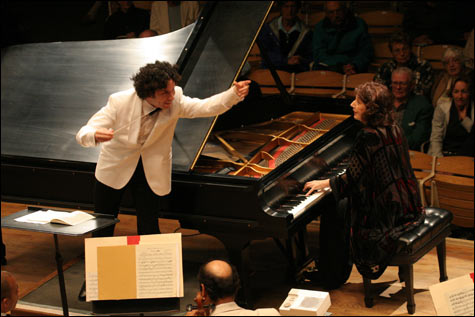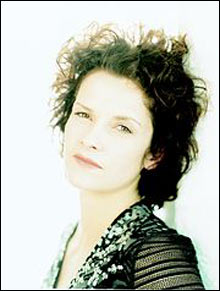
BEST DEBUT: Venezuela’s Gustavo Dudamel leading the BSO at Tanglewood. |
This year Boston classical music lost some of its most beloved figures — some, like mezzo-soprano Lorraine Hunt Lieberson, at the very height of their extraordinary powers, others, like opera director Sarah Caldwell and her conductor/collaborator, Osbourne McConathy, after long and gratifying runs. I’ll remember with affection superstar sopranos Birgit Nilsson and Elisabeth Schwarzkopf and the too-young Elizabeth (Betsy) Parcells, once a staple of the Boston opera scene. Boston (though not only Boston) also saw the demise of the record store. But let’s concentrate on what we have to be grateful for. Here’s my look back at 2006, a splendid musical year even under the worst circumstances.1 MOST AMBITIOUS PROJECT
BSO music director James Levine’s Beethoven/Schoenberg project, which demonstrated the relationship between two of classical music’s towering innovators. We got Schoenberg’s surrealistic song cycle Pierrot Lunaire with the BSO Chamber Players and legendary soprano Anja Silja; the Violin Concerto with Christian Tetzlaff; the Piano Concerto with Daniel Barenboim; that visceral and abstract monumental torso of an opera, Moses und Aron; and the romantic epic Gurrelieder, with Lorraine Hunt Lieberson, in her last Boston performances, as the sorrowing Wood Dove. Levine’s Beethoven was not as consistently successful, but the concerts in which he both preceded and followed the Beethoven and Schoenberg Violin Concertos (Tetzlaff in both) with his own string-orchestra arrangement of Beethoven’s Grosse Fuge represented the single most inspired piece of programming I’ve ever heard at the BSO.
2 BEST OPERA IN CONCERT
The highest of several high points of Levine’s Tanglewood season, and of the Mozart 250th-birthday year, was a concert version of Don Giovanni, a truly great performance of this comic and harrowing masterpiece — and how rare is that?
3 BEST REVIVAL
In 1979, Emmanuel Music under Craig Smith gave the first uncut American performance of Handel’s Orlando. This fall, Smith and Emmanuel Music began a three-part exploration of Handel’s three great operas based on stories from Ludovico Ariosto’s Orlando furioso. Smith’s conducting demonstrated not only expertise but wisdom, and both the singing and the playing (by some of the same musicians) were sublime. Countertenor Jeffrey Gall, sopranos Kendra Colton and Dominique Labelle, and mezzo-soprano Krista River were the outstanding singers.
4 BEST DEBUT
At Tanglewood, 25-year-old Venezuelan conductor Gustavo Dudamel, in his BSO debut, not only lived up to his reputation as one of the most exciting young musicians in the world but proved that the program to train young musicians in his native country continues to produce amazing musical results at the same time it’s saving hundreds of thousands of impoverished lives.
5 BEST COMEBACK
Benjamin Zander has won an international reputation for his performances of Mahler, both with Philharmonia Orchestra of London and here at home with his own Boston Philharmonic. In recent years, I’ve thought he was coasting a little. But his feverish and mercurial Mahler Fifth Symphony this year transported me back to the time when each of his Mahler performances had something new and devastating to say.
6 BEST STAGED OPERA
Intermezzo Chamber Opera has been specializing in brand new work, but its most successful efforts have been revivals of neglected 20th-century masterpieces. This year, my favorite fully staged opera was Intermezzo’s elegant low-budget version of Benjamin Britten’s Curlew River. It didn’t hurt that the superb cast, veteran music director James Busby, and young stage director Andrew Ryker got expert advice from Colin Graham, the gifted British director who staged the original production under the supervision of the composer.
7 MOST LIKELY TO SUCCEED
Of the many memorable new works performed this year by our excellent new-music groups, my favorite — no surprise to me — was the exquisite new choral piece by John Harbison, But Mary Stood (about Mary Magdalene), commissioned by the Cantata Singers and led by David Hoose with touching fervor.
8 BEST CHAMBER PERFORMANCE
The apple of my ear was Russell Sherman’s Mozart 250th-birthday survey with Emmanuel Music, and especially the poignant Wind Quintet in E-flat, in which he was joined by some extraordinary Emmanuel wind players: oboeist Peggy Pearson, clarinettist Bruce Creditor, horn player Neil DeLand, and bassoonist Thomas Stephenson. They practically turned this heavenly chamber piece into another Mozart opera.
9 BEST KEYBOARD CONCERTS
Pianist David Deveau (and chamber-music-playing friends) began the New Year with a Bank of America Celebrity Series Boston Marquee recital that ran an exhilarating gamut from classic Haydn to Romantic Liszt to modernist Webern to contemporary Peter Child. And composer Frederic Rzewski delivered an engaging and — especially in his “melodrama” based on Oscar Wilde’s De Profundis — moving solo recital at the Boston Conservatory of his own challenging and surprising music.

BEST VOCAL RECITAL: Austrian mezzo Angelika Kirchschlager’s was one of them. |
10 BEST VOCAL RECITALS
Hard to choose between two superb but very different mezzo-sopranos. Delores Ziegler, in a concert presented by Richard Conrad’s the Bostonians, sang tender, unaffected, intimate Schumann, sensitively accompanied by her NEC colleague John Greer. Nothing — least of all ego — comes between Ziegler and what she sings. And in a Bank of America Celebrity Series appearance, the glamorous young Austrian mezzo Angelika Kirchschlager (superbly accompanied by Malcolm Martineau) offered an international variety of art songs. Both these events were true lieder recitals, presenting great songs beautifully, honestly, and with no gimmicks. Maybe it’s not a dying art.